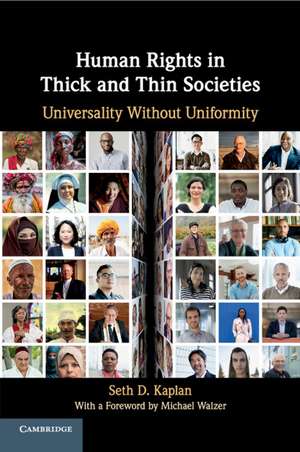Human Rights in Thick and Thin Societies: Universality without Uniformity
Autor Seth D. Kaplanen Limba Engleză Paperback – 7 aug 2019
Preț: 284.01 lei
Nou
Puncte Express: 426
Preț estimativ în valută:
54.34€ • 56.89$ • 44.97£
54.34€ • 56.89$ • 44.97£
Carte tipărită la comandă
Livrare economică 07-21 aprilie
Preluare comenzi: 021 569.72.76
Specificații
ISBN-13: 9781108457323
ISBN-10: 1108457320
Pagini: 269
Ilustrații: 6 b/w illus. 4 tables
Dimensiuni: 152 x 230 x 15 mm
Greutate: 0.36 kg
Editura: Cambridge University Press
Colecția Cambridge University Press
Locul publicării:New York, United States
ISBN-10: 1108457320
Pagini: 269
Ilustrații: 6 b/w illus. 4 tables
Dimensiuni: 152 x 230 x 15 mm
Greutate: 0.36 kg
Editura: Cambridge University Press
Colecția Cambridge University Press
Locul publicării:New York, United States
Cuprins
1. Introduction; 2. The UDHR: flexible universalism; 3. Cultural psychology's contribution; 4. Thick versus thin societies; 5. The limits of Western human rights discourse; 6. Case study: male circumcision in Europe; 7. Case study: Rwanda's Gacaca Courts; 8. Conclusion: a return to basics.
Recenzii
'In this timely and eminently readable book, Seth D. Kaplan charts a path for the survival of the universal human rights idea in an increasingly inter-dependent and conflict-ridden world. His 'flexible pluralist' approach is a fitting tribute to the Universal Declaration of Human Rights on its seventieth anniversary.' Mary Ann Glendon, Learned Hand Professor of Law, Harvard University, Massachusetts
'Universal claims to human rights appeal to our common humanity, but they can provoke resistance - both at home and abroad - when they fail to acknowledge varied cultural and religious contexts. Seth D. Kaplan's book is at once a guide to this resistance, an analysis of cultural diversity, and a program for dealing with disagreement and protecting those rights most critical to human flourishing.' Michael Walzer, Professor Emeritus, Institute for Advanced Study, Princeton, New Jersey
'This book explores the tension between universal human rights and cultural particularity with theoretical sophistication and empirical depth. It is the best effort I know to give each of these claims its due - and to chart a course that combines strengths of both into practical guidance for reformers. Even readers who disagree with some of Kaplan's recommendations will profit from his path-breaking analysis.' Bill Galston, Ezra K. Zilkha Chair and Senior Fellow, Brookings Institution, Washington DC
'This brilliant book both honors and advances the Universal Declaration on Human Rights. As he traces the fate of moral universals in culture and history, Seth D. Kaplan shows us how to be a moral pluralist and uphold principal rights at the same time - how to be a social justice advocate without being parochial and ethnocentric. It is a great accomplishment.' Richard Shweder, Harold H. Swift Distinguished Service Professor, University of Chicago
'Human Rights in Thick and Thin Societies: Universality without Uniformity … [is] a worthy and timely publication … [with] a focus on maximising the robustness of the relationships between individuals, institutions and communities and, in so doing, the common good.' Molly Thomas, Cross-cultural Human Rights Review
'Universal claims to human rights appeal to our common humanity, but they can provoke resistance - both at home and abroad - when they fail to acknowledge varied cultural and religious contexts. Seth D. Kaplan's book is at once a guide to this resistance, an analysis of cultural diversity, and a program for dealing with disagreement and protecting those rights most critical to human flourishing.' Michael Walzer, Professor Emeritus, Institute for Advanced Study, Princeton, New Jersey
'This book explores the tension between universal human rights and cultural particularity with theoretical sophistication and empirical depth. It is the best effort I know to give each of these claims its due - and to chart a course that combines strengths of both into practical guidance for reformers. Even readers who disagree with some of Kaplan's recommendations will profit from his path-breaking analysis.' Bill Galston, Ezra K. Zilkha Chair and Senior Fellow, Brookings Institution, Washington DC
'This brilliant book both honors and advances the Universal Declaration on Human Rights. As he traces the fate of moral universals in culture and history, Seth D. Kaplan shows us how to be a moral pluralist and uphold principal rights at the same time - how to be a social justice advocate without being parochial and ethnocentric. It is a great accomplishment.' Richard Shweder, Harold H. Swift Distinguished Service Professor, University of Chicago
'Human Rights in Thick and Thin Societies: Universality without Uniformity … [is] a worthy and timely publication … [with] a focus on maximising the robustness of the relationships between individuals, institutions and communities and, in so doing, the common good.' Molly Thomas, Cross-cultural Human Rights Review
Notă biografică
Descriere
Introduces the idea of a flexible approach to the human rights movement that returns to basics in an increasingly diverse and multipolar world.
